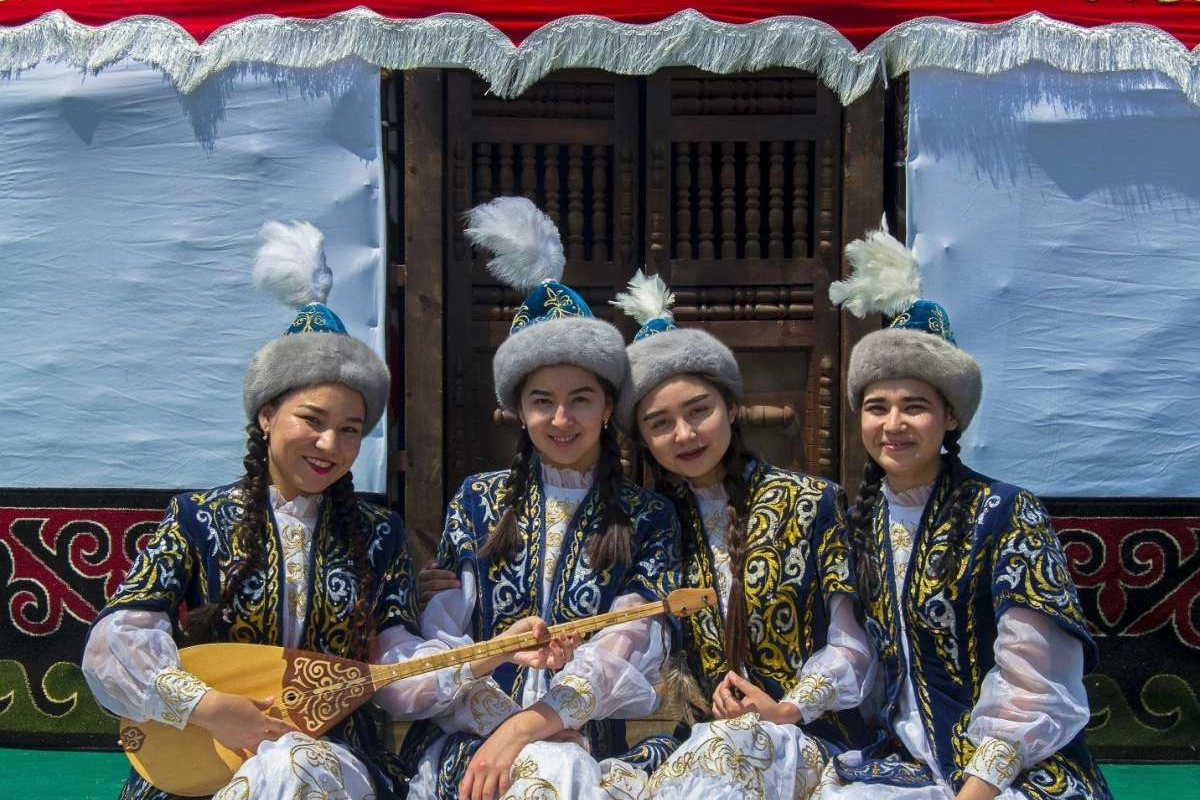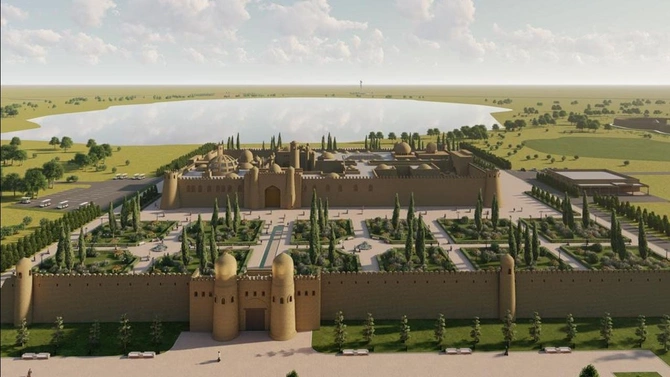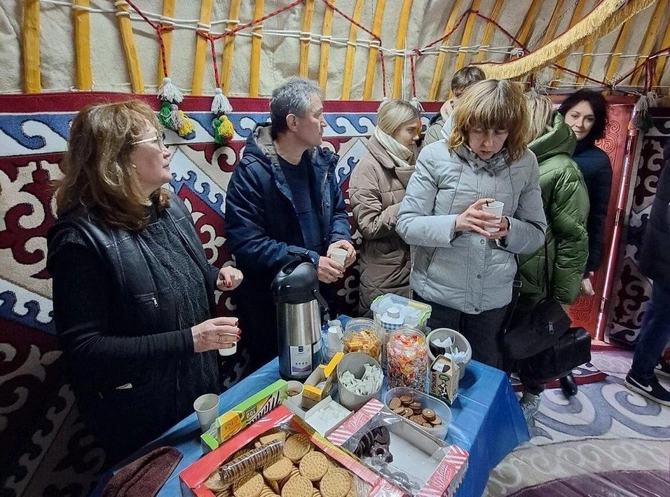
Kazakhstan is looking to its roots for a new cultural revival.
Image: Cholpan/Shutterstock
Although slow and modest reforms had been underway in Central Asia for some years before February 2022, Vladimir Putin’s botched full-scale invasion of Ukraine has turbocharged change in a region suddenly propelled into a new geopolitical reality. Connecting China with the West, Kazakhstan is reviving its ancient Silk Road reputation as a critical transport and trade route with enormous geopolitical significance.
But it is not only a geopolitical revival that Kazakhstan is experiencing. As is the case worldwide, political change is often accompanied by a corresponding magnitude of cultural change. In Kazakhstan, the decline of Russia has led not only to a revival of its ancient geopolitical significance in the form of transport and trade routes, but also to a profound cultural revival of the ancient traditions and customs that herald from the same era.
At the heart of Kazakhstan’s cultural revival is a perception that its traditional culture was dying out, for centuries oppressed by a colonial power. Indeed, it was under the Russian Empire, and especially under its successor incarnation in the form of the Soviet Union, that ancient Central Asian cultures suffered enormously under homogeneous, proletarian culture imposed from Moscow.
So, while Russia may be losing its influence in Kazakhstan politically, what matters in cultural terms for Kazakhstan is the withdrawal of what Russia represents. The result is a cultural revival in which Kazakhstan is rediscovering and reimagining the opposite: its traditional language, music, clothing, crafts, literature, symbols and so on from its pre-Russian, pre-Soviet past to construct its post-Russian, post-Soviet future.
Nowadays, stories frequently emerge from Kazakhstan that demonstrate the cultural revival that has taken hold over the past few months, testifying to the magnitude of the national consciousness-raising that Vladimir Putin has inadvertently unlocked.
Traditional Kazakh dress is reportedly experiencing a surge in popularity, accompanied by calls from officials to embrace traditional dress in everyday life. Notably, this is not dissimilar to the revival of the Ukrainian embroidered shirt, the vyshyvanka, and the symbolism that Vyshyvanka Day took on in May 2022, three months into the full-scale invasion of Ukraine.
At the end of April this year, the Kazakh Ministry of Culture and Sports announced plans to construct a huge open-air museum near Astana that will reflect several thousand years of ancient steppe civilizations. Unsurprisingly, the Russian and Soviet eras will not feature, but then, after all, the idea behind this revival is, if anything, to demonstrate that Russian oppression was, although extremely painful, only an aberration.

Image: gov.kz
But for a cultural revival to succeed in the 21st century, it is not enough to revive whatever object, practice, sound, or tradition, and then do nothing with it. There must be a synergy between past, present, and future. To this end Kazakhstan must somehow reinvent and reimagine its ancient culture in a contemporary context to demonstrate that it can stay relevant not only today, but tomorrow as well. Just as the camel trains of old have been reimagined as metal trains today, Kazakhstan’s cultural revival is doing the same.
Traditional Kazakh patterns known as oyu are experiencing a revival in Kazakhstan, with women popularising the trend on social media. One of them is the young artist Aidana Baidalina, who, speaking to The Astana Times, said that “ethnic self-expression is crucial for Kazakh people, especially since our art and culture were suppressed in the early 20th century. We are proud to bring it back, giving us more confidence. Someday, we will understand that we don’t have to prove anything to anyone.”
Meanwhile, Turan, one of Kazakhstan’s foremost ethno-folk groups, combines traditional Kazakh instruments with more modern artistic motifs and recently went on a European Tour to several countries as well as performing and giving lectures on Kazakh folk music in the United States. Internationalization is essential for 21st-century cultural revivals.
As recently as 1 May this year, the Astana Ballet Theater premiered Jety Kazyna, a one-act ballet based on an ancient legend about the seven treasures of a Kazakh nomad. This ballet, in particular, reaches back into Kazakhstan’s ancient past to look for inspiration in the present, guiding people toward the future. The ballet’s director, Ualitbek Siyazbek, said, “The deeper the tree lets its roots go, the higher it grows. We shall tell our future generation about our culture and history through dance, prose, and art.”
These revivalist rumblings have been lurking for some years. The Spirit of Tengri contemporary ethnic music festival, held in Kazakhstan since 2012, is making a comeback in June 2023 after a three-year absence. In the world of sport, in 2024, Kazakhstan will host the fifth World Nomad Games, an international competition dedicated to the traditional sports of Central Asia that has grown in size and popularity since the first games were held in Kyrgyzstan in 2014.
Back in the present day, one should not forget Kazakhstan’s “Yurts of Invincibility” initiative in war-torn Ukraine, providing warmth, electricity, food, and drink to those in need. Initially a stoic symbol of Kazakhstan’s nomadic tradition, the humble Kazakh yurt has now been imbued with a new 21st-century connotation, one of strength, defiance, independence, and post-colonial solidarity with a country that has also long suffered on the wrong end of Russian rule.

Image: odessa-journal.com
Of course, it is back to Ukraine that one must turn to fully appreciate the rationale behind Kazakhstan’s cultural revival. While not fighting an existential war, threats from Russian propagandists against Kazakhstan are understandably met with a strong cultural response that clearly underlines that Kazakhstan has no intention to be ruled again by Moscow.
On the contrary, the past 20 years have shown that the harder Russia has pushed to co-opt Ukraine, the harder Ukraine has pushed back and strengthened its own national identity in the process. Kazakhstan is now demonstrating very similar trends.
In this changing geopolitical context, Kazakhstan is reaching back into its history for cultural signposts to show the nation the way forward. Kazakhstan’s ongoing cultural revival desires to underline its separation from the imperial power that has in the past tried so hard to oppress everything that now holds the key to the country’s brighter future.
Share on social media